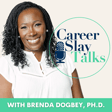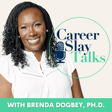Become a Creator today!Start creating today - Share your story with the world!
Start for free
00:00:00
00:00:01

012: Imposter Syndrome or Imposter Treatment with Dr. Helen Ofosu
In this episode we talk to Dr. Helen Ofosu is a career and buisiness psychologist, a multi-award-winning published author, executive career coach and advocate for black professionals in Canada. In this episode, she shares her own experience and discusses imposter treatment and how black and marginalized professionals are often treated and disrespected in professional spaces. She offers 5 tips on how to build resilient careers that will stand the test of time.
Transcript
Imposter Treatment in Black Professional Community
00:00:00
Speaker
sometimes there's a little bit of imposter syndrome but really I think that with this community it's more imposter treatment.
00:00:13
Speaker
and you don't have to read on that because that needs to be unpacked.
Introduction to Curiously Talks Podcast
00:00:18
Speaker
Hello everybody and welcome to another episode of the Curiously Talks podcast. My name is Brenda Dogbay and in this podcast we center Black-Canadian voices in the African diaspora and the space of Black professionals when we talk everything, career progression, growth, and everything that can help you slay your career and take your career to the next step.
00:00:40
Speaker
And today I have the pleasure of speaking with Dr.
Interview with Dr. Helen Ofosu on Career Resilience
00:00:45
Speaker
Helen Ofosu. She is a powerhouse, a career coach, a PhD, and she's been working in this career development space from a psychology perspective for over 20 years. And she also just recently published a book
00:01:02
Speaker
I'm going to share it right here it's called how to be resilient in your career and she has her copy too and so we're really excited to talk to you Dr. Helen about building resilient careers and especially career transitions because I think I get a lot of questions from my audience around career transitions
00:01:25
Speaker
And this is something that I think puts you really interested in understanding how to better manage them and then how to minimize the challenges associated with them. So why don't we start by hearing from you. How did you get into this career space and your consulting work?
Dr. Ofosu's Path to Psychology and Career Development
00:01:45
Speaker
We want to hear it all. So over to you.
00:01:47
Speaker
Well, it's ironic. I actually consider myself an accidental psychologist because when I started university, I really wasn't sure what I was going to take. So I had a full year of chemistry, biology, physics, and calculus, and I was looking for one more full year elective or two half electives.
00:02:07
Speaker
And a friend who I'd known since childhood, we went to camp together, we worked at camp together, and he was a little older than me. And he's the one who said, oh, you should take psychology. It'll open doors for you. So that's literally how I even got the bug for psychology. And I liked it because it's kind of multidisciplinary. There's, of course, the traditional psychology pieces, but there's some stats.
00:02:37
Speaker
brain and behavior, there's all these different things that are part of psychology. And then when I graduated, I took a gap year because I wasn't sure what I was going to do next. And in the end, I decided because I like business, I would either do an MBA or do industrial and organizational psychology, which is basically work and business psychology.
00:03:03
Speaker
And in the end, I decided to become one of few instead of one of more, you know, one of many in a sense. So that's how I got into psychology.
Transition from Public Service to Consulting
00:03:13
Speaker
But my first job was in Ottawa. So I was actually recruited right out of grad school.
00:03:19
Speaker
And I was working with a group of other organizational psychologists. And I got very good at things like succession planning, developing the criteria for screening, you know, for screening, but also for hiring, for promotion, identifying people with higher potential for development. So that's really how I got into the career space.
00:03:45
Speaker
And was this in the public sector or in the private sector? This was at the Public Service Commission, so federal government. I worked there, I worked at Global Affairs, and I worked at D&D. And you know, it was all good for a while until I started feeling a little too boxed in. Boxed, yeah. And so it started as a leave of absence to kind of test the waters in the private sector under my own shingle.
00:04:16
Speaker
And it was tough at first, but I quite love what I'm doing and I'm grateful that I stuck it out because now I'm doing far more than I would have been allowed to do had I stayed in the public service. Absolutely. Yeah.
00:04:33
Speaker
but that must have been a scary transition to make, right?
Challenges of Moving to Entrepreneurship
00:04:38
Speaker
Like leaves of absence feel still a little safe, but how is that final decision to say, okay, I'm cutting loose and I'm betting on myself? Well, it was stressful for sure, but I
00:04:53
Speaker
I don't know. It was a leap of faith for sure, because at the time I was a single parent, because I was divorced many years ago. And like you said, I basically just bet on myself. Because many of my colleagues, now some were very supportive, but many just figured, oh, well, good luck. Nobody does that.
00:05:17
Speaker
Who leaves government, right? I'm sure. That's probably what a lot of people were saying,
Role of a Black Psychologist
00:05:23
Speaker
right? Well, that's it. And the truth is that many of the people I left are still in the exact same jobs that I left them in 11 years ago. It's ridiculous. It is, actually. Yeah. But in fairness, I was always an outlier in psychology. I'm probably a bit more extroverted, definitely more entrepreneurial, probably more creative.
00:05:48
Speaker
than many of my peers. So it's been a good fit. Oh, that's great. And so maybe talking a little bit about some of the clients you work with, especially black professionals, what are some of the issues that are recurring that tend to come up over and over?
Common Issues for Black Professionals
00:06:11
Speaker
Well, I'd say, okay, cause I do some executive coaching.
00:06:18
Speaker
I do career coaching and I do some HR work. So I'd say maybe 30 to 40% of my work is with executives.
00:06:28
Speaker
And of that, it may be about 50-50 Black versus other groups. And for sure I have a lot of extra things to offer to Black professionals because I know that experience. And so, you know, it could be a range of things.
Impact of Imposter Treatment and Microaggressions
00:06:46
Speaker
I think the common issues are being underestimated, sometimes being excluded.
00:06:58
Speaker
dealing with racism and just navigating work as a Black woman, because that's very different from every other group. Sometimes there's a little bit of imposter syndrome. But really, I think that with this community, it's more imposter treatment rather than imposter syndrome.
00:07:19
Speaker
Oh, and you're allowed to read on that because that needs to be unpacked. So the classic version of imposter syndrome is when people feel that they don't deserve to be where they are, that maybe they got there by mistake or through like a favor and that they're kind of a fraud and somebody's going to notice at some point and throw them out. So that's the normal version of imposter syndrome.
00:07:46
Speaker
But I think what happens to many of us is that we know we are amazing. And you never have to be that much more, right? You don't get in the door unless you are...
00:08:00
Speaker
equally or better, usually better qualified than another candidate. You have counterparts, yeah. Yeah. So it's not usually that we don't think we're good enough. It's just that after time, having people picking at you, picking on you, microaggressions, making you feel like you don't belong, underestimating you, maybe having the experience of being passed over,
00:08:29
Speaker
kind of low-key exclusion, all of that stuff. And high-key sometimes. Yeah, you're right. The big, bold stuff, but also the subtle stuff, right? So all of these things have a way of chipping away. Chipping on your confidence. That's it. So I think it's more imposter treatment rather than classic imposter syndrome.
00:08:53
Speaker
And I like how you're framing that because imposter syndrome always looks inward. Like there's something wrong with me. I'm the problem. I'm not qualified. And so, and often the antidote to that is just feel more confident, like be bolder, this and that. However, I think what's powerful about imposter treatment is it acknowledges that
00:09:20
Speaker
A lot of the times you're not the problem, which is not to absolve individuals of their responsibility, you know, in whatever role you play in that context. But there is a lot often that's at play that's actually outside of us. And that's that imposter treatment where you be treated less than
00:09:41
Speaker
And then you're under this pressure and it's not imagined. I think that's where it gets tricky. At least for me, I find it hard to get out of your own head where, you know, am I imagining it? Was that a real microaggression? Am I the problem? But imposter treatment really helps you heal from the fact that I'm not flawed. The system is treating me unfairly and in a flawed way.
00:10:04
Speaker
But also, as I was listening to you, I was remembering something else.
Leveraging Unique Positions as Black Professionals
00:10:09
Speaker
Quite often, people know they're mistreating us, but they're also kind of downplaying what they're doing or explaining it away or trying to make it seem like, oh, you're just being too sensitive or whatever. Plus, there's like- They minimize our reaction to their intentional mistreatment. Yeah.
00:10:30
Speaker
knowing full well that they're doing something that's unfair and you're being treated differently, right? And so all that gaslighting, it creates some internal confusion. Am I exaggerating? Am I being too sensitive? Was that racist? And honestly, I think every episode I've had, that tends to be a question where you can do community so that you could ask yourselves and say, did I imagine that? Was that real?
00:10:57
Speaker
And another theme that comes up again and again is this whole thing about being one of very few or being the only. Yes. And for me, I feel it myself very, very acutely, because as a Black psychologist, I am literally a unicorn in Canada. You are. That's a whole other conversation. That needs to be in fact in its own way.
00:11:24
Speaker
Well, I mean, we've done our own research, and the best estimate we have is 30 Black psychologists in Canada. 30? I believe the Black Canadian population is about 4 million. And the Canadian population is 40 million. So basically, there are none.
00:11:46
Speaker
No, exactly. And again, if we're thinking quota, right, like for everyone who needs one, who is available to you? I want to revisit what you mentioned around that being alone, because that's another recurring thing, the lonely only, right? Let's talk a little bit about that experience, because I certainly have experienced it several times, and I'm sure I'm not alone in this.
00:12:16
Speaker
And the thing is that when you are the only or one of few, sometimes the tendency is to try to blend in. But you know what? I walk into a room, there is no such thing as blending in. Everyone is going to notice there's a black woman here, right? So I figure, you know what? I'm going to own that, and I'm going to make the most of it. They will always remember me because I was the only one.
00:12:44
Speaker
So I try to convert that into part of my strength and part of my value instead of trying to blend in because let's face it, nobody who's successful.
Addressing Tokenism and Systemic Racism
00:12:58
Speaker
and memorable blends in. Not at all. Never. Not at all. So I figured I'm just going to be in undergrad because I remember that was my huge culture shock where I was one Black student in organic chemistry. I think that was my first class in undergrad.
00:13:15
Speaker
the one Black girl in a sea of 300 people, not a single soul looked like me. And it was jarring, but then at some point I was like, when I need references, the prof is going to remember me because I was at the Black girl who sits on the back, okay, I remember you. And so I really appreciate that, like the mindset shift where it's not something that you're holding against yourself, but that you're owning and leveraging.
00:13:42
Speaker
And I have another piece to it. Sometimes we think if we're the only one, how can we possibly make a difference? But I heard this amazing analogy. You have kids, so I'm sure you've messed around with food coloring.
00:14:00
Speaker
not food poisoning, food coloring. So you put one tiny drop of pink or a green or a blue in water or a milk, the whole thing changes.
00:14:17
Speaker
Ooh, I'm going to do that. They feel the same too, that they are experiencing that in their schools and whatnot. So being able to see that color.
00:14:33
Speaker
It literally makes a difference. I love it. That's it. So those are some things, but tokenism is another thing. Yes. Right? Because so many people want to diminish what we are doing, what we are contributing, and why we're here. Yes. And it makes me crazy. Because I know what I have done to get here.
00:14:59
Speaker
Right. So how do you fight that? I mean, how do you overcome it? Because there's imposter treatment, which I think the other side of that imposter treatment, that coin, is tokenism. Well, you only got here to fill the quota. Whereas you know full well that all the people you're seeing in that room, in that boardroom, in that team, you know that you're more qualified.
00:15:28
Speaker
Right. So how do we, how do we navigate that? Well, you know, we had a beautiful real life example a few years ago. You remember the US college scandal? Remind me. Okay. So the gist of that is that in the United States, a big scandal broke out where it became crystal clear that for decades, people who had a lot of money
00:15:54
Speaker
or like rich people and celebrities were basically gaming the system. They were giving donations to universities or getting people to pay. Not just mothers, but the scandal of people trying to get in, whether it's through SAT scores, legacy money. I think Michelle Obama talks a lot about there's a lot of Fuota people.
00:16:20
Speaker
So it's not just affirmative action, there's the legacy money. Exactly. So people who's so the legacy is a bit different because these are people whose parents went so they have an easier road getting in.
Career Transition Advice from Dr. Ofosu
00:16:33
Speaker
But the scandal was about people who had others take SATs, or they'd create fake portfolios to make these kids look like they were varsity athletes. They were given scholarships and admission, even though they didn't play water polo or
00:16:48
Speaker
or whatever the sport was. But the takeaway is that you have these people who did not deserve to be there. White people who did not deserve to be there, who had actually taken places. These are competitive positions, taken places from Black and other racialized people who were qualified. But guess what? When they got there, they made the most of it.
00:17:15
Speaker
They did not worry about how they got there. They just did what they could. So my feeling is, you know what? They've earned your place. Get in there and do your best. Especially when you know you've got a PhD. You know they didn't give that to you.
00:17:35
Speaker
You had a sweat and maybe bleeding and crying. The journey to finish was so arduous. And, you know, the more, again, the more you share with people, you realize that your, your experience was not unique. A lot of us went through a very similar experience. So I wanted to talk a little bit about career transitions and just how you guide
00:18:04
Speaker
folks through career transitions and you know your book is about how to be resilient in your career. I think transitions are particularly hard
00:18:15
Speaker
at almost any season. So I recall, you know, your quarter life crisis, if you want to call it when you're 25 and you finished university, you don't know where you're going, you don't know what you're doing next. And then each subsequent transition also comes with its own growing pain. So what are some of the skills or tactics that you recommend for folks who are navigating transitions?
00:18:42
Speaker
Well, first of all, these things are very unique. So I take, I mean, there's definitely some overlap, but I try to treat each person and their circumstances for what it is. And, you know, often the big thing is remembering that even if somebody makes a choice to change jobs or pivot into a new direction,
00:19:07
Speaker
they're allowed to change their mind. They don't have to think of it as a one-way thing where they must go down one path, and if they don't like it, they are doomed, and that's the end of it. Right. So remembering that when you look back at a career, it's really about these stepping stones. So so long as you're taking a step towards something that's a better fit for you,
00:19:30
Speaker
That's meaningful. And it's
Skills and Networking for Career Longevity
00:19:33
Speaker
good. It's usually not one gigantic step that happens all at once. Usually it's maybe not baby steps, but smaller steps. Because most people who are hiring any kind of professional are probably not
00:19:49
Speaker
trying to do one radical thing, right? They're not going from being a lawyer to being a psychiatrist in one step. There's multiple little steps. So that's definitely a part of it.
00:20:05
Speaker
I think the cover of my book or the title of my book is sometimes misleading because I'm really focusing on doing things that allow you to have a long lasting career. Yeah, so that's not about it up so that folks can see what the cover looks like.
00:20:23
Speaker
Yeah. So it's not about doing things to boost your own personal resilience, because I think if anything, many of us overuse our personal resilience. So there's that distinction between the personal versus the professional resilience.
00:20:40
Speaker
That's it. And so with these transitions and these pivots, it's making sure that whatever you do, you're going to be gaining some extra skills, some experience, a broader network, something that you can take with you that makes your career more sustainable in the long term. Right. And it's about, I guess, building your toolkit so that you could constantly come back to it
00:21:08
Speaker
and you are diversifying the types of tools so that regardless of what circumstance you find yourself in you've got enough to to fall on. And anyone who I'm dealing with who has like a reasonably good personality and that's most of the people? Most. Well I mean it's it's rare
00:21:30
Speaker
I mean, people who have awful personalities probably don't want to be talking with me one-on-one anyway, right? So most people have pretty good personalities and I ask them in all seriousness, what would you rather do? Write a cover letter? No, no, search online for a job.
00:21:52
Speaker
Revisit your resume, your cover letter, customize everything, apply, have a phone interview and then maybe some testing or a preliminary interview and then another interview and then the thorough reference check. Would you rather do that or would you rather have a bunch of coffees and lunches?
00:22:14
Speaker
Obviously, most people would rather have the coffees and the lunches. Even if they're paying for it. Because at the end of the day, if you know enough people who know you well enough,
00:22:30
Speaker
that's going to create opportunities that you're never ever going to get if you are relying on this brute force applications, right? Yes. How do you navigate networking though? Because I know, you know, coming back to some of what we talked about initially, there's the challenges faced with
00:22:53
Speaker
So there's the imposter treatment where you're also being viewed as less than, maybe sometimes being looked over, you might not be in the high profile or high visibility files.
Overcoming Cultural Hurdles in Networking
00:23:10
Speaker
And then for some people, I know they've tried to network and it doesn't work in that, you know,
00:23:18
Speaker
Either you send your resume and because of the name or whatever, there's the name discrimination and nobody really calls you back or that the conversations feel futile. So how do you encourage folks to navigate networking when sometimes culturally putting yourself out there and reaching out and boldly asking folks for coffees and lunches might not be within either your cultural or personality comfort zone?
00:23:48
Speaker
Well, first thing, when you want different results, you got to do different things. And I do all kinds of things. It's hard sometimes, but I do things every year I'm doing things that I never thought I'd have to do because
00:24:06
Speaker
I'm doing something new. I mean, recording this book for Audible, I was having these drops of like oil of oregano. So my voice would be consistent every day. It was terrible. Right. So remembering that is helpful. And when I say networking, I don't mean send your resume to somebody because that's not really networking. True. Right. So fundamentally, I think networking is about finding ways to create mutually beneficial relationships.
00:24:36
Speaker
And you go from there. And let's face it, not everyone is open to networking with us. You can tell when certain people don't want to network with you. So that's not where you start. You work with folks who are a bit more open. And I admit that I have it a little easier than people who are employees. Because for me,
00:24:59
Speaker
Well, almost everybody knows that I'm Black before they interact with me. So if they hate Black people, they're probably not calling. Or whatever I have is so irresistible that they're going to be polite and respectful.
00:25:17
Speaker
Right. So I recognize that that is an advantage that I have because I'm not an employee. But, you know, we can often feel when somebody just doesn't warm up to us. It's not a feeling. And that happens regardless of I think your background, the people who are, you know, you just don't oil and water and that's, you know, it is what it is. I like your definition of networking as
00:25:42
Speaker
building mutually beneficial relationships. Because a lot of the time, and I get people send me a C visa or hit me up on LinkedIn, and they're like, I need a job. And then that's a conversation ender real quick, because I don't have a job. That's it. Yeah. Whereas I think the more when folks approach it from a perspective of curiosity, then there's that mutual curiosity where we want to I want to learn about you just as much as you would want to learn about you as well.
Building Long-term Relationships
00:26:12
Speaker
And the truth is that everybody talks about networking, but there are some mechanics that are helpful. And I don't think we have enough time to get into all of it, but there's certainly a chapter that's all about networking and diligence, because these are not things that happen overnight. You need some time, right? Because relationships that are meaningful
00:26:35
Speaker
It's not always- They're not instant coffee relationships. Yeah. I mean, sometimes it's love at first sight, but not always, right? Yeah. And if it's always love at first sight, then a little bit of a question mark there. So maybe to bring the conversation together, what are maybe five tips that you could share with our audience on how they could build resilient careers? And I really appreciate that you made that distinction between
00:27:03
Speaker
personal resilience and our tendency to maybe even erode some of it.
00:27:07
Speaker
versus the type of professional resilience where you have that longer term view of your career journey. So any tangible, actionable tips that you can share? Yeah, so that's a good one because the career resilience allows you to stay the course and not burn yourself out. I'm going to cheat a little bit and pick up my book and see what the chapter titles are because really and truly,
00:27:37
Speaker
It's in there. Well, it's in there. And, you know, just last week, somebody said, oh, my goodness, your book is like cheat codes for a career. And I thought, yes, that's exactly what it is, because I'm sure that's what we do. Like I said, I keep it close because I want to be able to refer back and say, you know, OK, what was that chapter on? So so walk us through five
00:28:02
Speaker
Quick tips that we could, and if folks want the deeper dive, they're certainly welcome to get the book.
00:28:09
Speaker
So I think another, so the career resilience is one, I think relationships and building a good network.
Networking vs. Intelligence and Hard Work
00:28:17
Speaker
That right there, I think it's more important than being smarter, being hardworking. If I had to have a choice between being brilliant and being somebody who's got a great personality and a good network, I would choose the network every single time. Really interesting. Absolutely, because most of the people who I know who are very successful,
00:28:37
Speaker
Yeah, they're smart enough, but it's their network that seems to have changed everything. True. So that's two, number three.
Impact of Workplace Mistreatment
00:28:51
Speaker
even if you can, this is for black folks in particular or racialized folks, even if you can tolerate being mistreated, right? Because some people seem to have a tolerance for it. You just think, well, I can just gut it out. Yeah. You know, I'm getting paid, whatever. The fact is, it is hurting you.
00:29:13
Speaker
Even if you can tolerate it, what it's doing to your heart, your mind, and also your physical body, it is not trivial. There's research now that shows that this chronic mistreatment has a cost. It shows up in your body and can lead to illness and other things.
00:29:35
Speaker
Yeah, and it's cumulative. I think that's the part that we don't internalize. Sometimes we will see it in health challenges further down the line, but it really is cumulative. Yeah. I forget how many have we covered now. Okay, we've got three so far. We've got three. I think another one, and it's related to this mistreatment thing.
00:30:03
Speaker
But just because we can tolerate something doesn't mean it's not having an impact on our work performance. True. Because there's usually a link. Because at the end of the day, if we are stressed out, exhausted, distracted, whatever, these things eventually start to have an impact on our performance at work.
00:30:25
Speaker
So this mental health and wellness piece, it's not really important. And it's not to be minimized or ignored. Final tip. Final tip. This one's a bit controversial.
Support Networks for Resilience
00:30:43
Speaker
I love that. Everybody loves a good controversy. So especially during the pandemic, I noticed that everybody who I knew doesn't matter what their gender was, their race, everybody who seemed to survive okay had special support in place.
00:31:04
Speaker
They probably had a coach or a mentor. They probably had a faith person. They may have had a therapist. And if they're lucky, they had at least one confidant, whether that was a partner or close friend. A partner, friend, whoever that person was. Yeah. And so especially for racialized leaders,
00:31:30
Speaker
I think that finding somebody to talk through all those hard things, especially some of the racial trauma that we're going through is a big deal. And it could be a friend, it could be somebody else. I'm a psychologist, so I see the brilliance of working with people who know how to help us process these things quickly so that things that happened years ago don't trigger us in moments right now.
00:32:01
Speaker
Absolutely. And that's really key because if there's something I'm learning is that the importance and the value of community, and not just community writ large socially, but I think building even micro communities, whether it's a community of professionals or community of, you know, black women executives or community.
00:32:21
Speaker
finding people who have a shared common vision and then leveraging that to really sound off, learn from, and even consult and comfort one another. And that's so powerful. Yeah. And all of that is captured by, you know, either that community of practice or that combination of therapist, coach, mentor, confidant. Faith person. Yeah. Faith person. So key. So key.
Dr. Ofosu's Book and Online Presence
00:32:49
Speaker
So where can folks find you? This is a shameless plug place. Number one, let's start with where can folks find your book and then where can folks find you online? Well, the book is available on Amazon, chapters, pretty much anywhere where you'd want to buy a book. And in fact, if you go to theresilientcareer.com,
00:33:17
Speaker
You can find how to buy the book. You can buy it online for sure. But if you want to buy it from a local bookseller, all the information's there, ISBN and whatever. It'll soon be on Audible as well. In the coming weeks, it'll be on Audible.
00:33:33
Speaker
And all my social media is there as well. Okay. I'm experimenting with TikTok a little bit. Oh, good for you. Yeah. I'm not there yet, but we'll get there. My kids are trying to get me there, but I'm like baby steps, okay? Instagram. I figured at least one, one platform. Let's take it one step at a time.
00:33:51
Speaker
And it's different because for you, you are a full-time public servant. So this is a side hustle. This is a passion project. So I respect that. And I'm not so sure I'd be taking on as much social media if I was doing it part-time. And I have somebody who helps me with it. In fact, two people who helped me with it.
00:34:12
Speaker
Sometimes three. So it's... You got a team, which is important and amazing. So what is your social media handle? So is it IO Advisory? It is not. For the most part, it's Dr. Helen O.
00:34:30
Speaker
C-A. Okay. And so that's who I am on Instagram, on Twitter, X, and what else is there now? TikTok. And LinkedIn, I'm just me. Yeah. Ellen Fosa, yes.
00:34:45
Speaker
Love it, love it, love it. Well, thank you so much for your time. Thank you so much for sharing these amazing insights. I'll make sure that when we share the podcast, we'll also share the links. I think resilientcareer.com seems to be the hub where folks can find out more about the book and where to meet you. And you also take on clients, if I'm not mistaken.
00:35:10
Speaker
I do. I take one-on-one clients for career coaching, for executive coaching, and some HR work, sometimes helping organizations with their hiring or EDI interventions, research. Excellent. Excellent. Well, thanks for coming. I'm sure there's so much more for us to talk about. So we'd love to have you come back again, but thank you for your time and let's continue this play together.
00:35:39
Speaker
Absolutely. Thank you for having me. It's been a long time coming.





